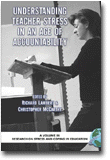
Understanding Teacher Stress in an Age of Accountability
Edited by:
Richard G. Lambert, University of North Carolina at Charlotte
Christopher J. McCarthy, University of Texas at Austin
A volume in the series: Research on Stress and Coping in Education. Editor(s): Christopher J. McCarthy, University of Texas at Austin. Richard G. Lambert, University of North Carolina at Charlotte.
Published 2006
School districts today face increasing calls for accountability during a time when budgets are stretched and students’ needs have become increasingly complex. The teacher’s responsibility is to educate younger people, but now more than ever, teachers face demands on a variety of fronts. In addition to teaching academic content, schools are responsible for students’ performance on state-wide tests. They are also asked to play an increasingly larger role in children’s well-being, including their nutritional needs and social and emotional welfare. Teachers have shown themselves to be more than capable of taking up such challenges, but what price is paid for the increasing demands we are placing on our schools? Understanding Teacher Stress in an Age of Accountability is about the nature of teachers stress and the resources they can employ to cope with it.
Accountability is a two-way street and the authors in this volume suggest remedies for reducing teacher stress and in all likelihood increasing student learning—greater administrative support, more and better instructional materials, specialized resources targeted at demanding children, parental support, and professional recognition. Readers will discover that lack of funding, low pay, concerns about academic performance and student misbehavior, and increased public and governmental scrutiny are not exclusive to the United States. In this volume, the third in a series on Research on Stress and Coping in Education, authors from Australia, Turkey, Malaysia, and the Netherlands sound the same alarms, post the same warnings, and draw similarly disturbing conclusions.
CONTENTS
Forward, Mimi Wolverton. The Stress of Accountability: Teachers as Policy Brokers in a Poverty School, P. Taylor Webb. Weighing the Risks with the Rewards: Implementing Student-centered Pedagogy within High Stakes Testing, Michael M. Grant and Janette R. Hill. Teacher Stress and High Stakes Testing: How Using One Measure of Academic Success Leads to Multiple Teacher Stressors, Sandra Mathison and Melissa Freeman. Shared Needs: Teachers Helping Students with Learning Disabilities to Cope More Effectively, Nola Firth, Erica Frydenberg and Daryl Greaves. Multicultural Competencies and Teacher Stress: Implications for Teacher Preparation, Practice, and Retention, Sylvia C. Nassar-McMillan, Meagan Karvonen, and Cheryl Young. Teacher Stress and Classroom Structural Characteristics in Preschool Settings, Richard Lambert, Jeni Kusherman, Megan O’Donnell, and Christopher McCarthy. Stress in the Student-Teacher Relationship
in Dutch Schools: A Replication Study of Greene, Abidin, & Kmetz’s Index of Teaching Stress (ITS), H.A. Everaert & J.C. van der Wolf. Sources of Teacher Demotivation, Zeynep Kltepe. Teachers’ Job Stress and Human Resource Development: The Malyasian Experience, Reynaldo Segumpan and Fazli Bahari. Relationship of Teachers’ Preventive Coping Resources to Burnout Symptoms, Christopher McCarthy, Debra Kissen, Lauren Yadley, Teri Wood, and Richard Lambert. The Relationship between Burnout and Stress Among Special Educators, Stacey L. Edmonson. Helping Teachers Balance Demands and Resources in an Era of Accountability, Christopher McCarthy & Richard Lambert. Author Bios.
-
Paperback978-1-59311-473-2
Web price: $45.04 (Reg. 52.99)
-
Hardcover978-1-59311-474-9
Web price: $80.74 (Reg. 94.99)
- eBook9781607525233

- EDU029000 - EDUCATION: TEACHING METHODS & MATERIALS: General
- EDU015000 - EDUCATION: Higher
- EDU037000 - EDUCATION: Research
-
 Higher Education for the People
Critical Contemplative Methods of Liberatory Practice
Higher Education for the People
Critical Contemplative Methods of Liberatory Practice
-
 International Perspectives on Teacher Stress
International Perspectives on Teacher Stress
-
 Mindfulness for Educational Practice
A Path to Resilience for Challenging Work
Mindfulness for Educational Practice
A Path to Resilience for Challenging Work
-
 Personality, Stress, and Coping
Implications for Education
Personality, Stress, and Coping
Implications for Education
-
 Research on Teacher Stress
Implications for the COVID-19 Pandemic and Beyond
Research on Teacher Stress
Implications for the COVID-19 Pandemic and Beyond
-
 Stress and Coping of English Learners
Stress and Coping of English Learners
-
 Toward a Broader Understanding of Stress and Coping
Mixed Methods Approaches
Toward a Broader Understanding of Stress and Coping
Mixed Methods Approaches

